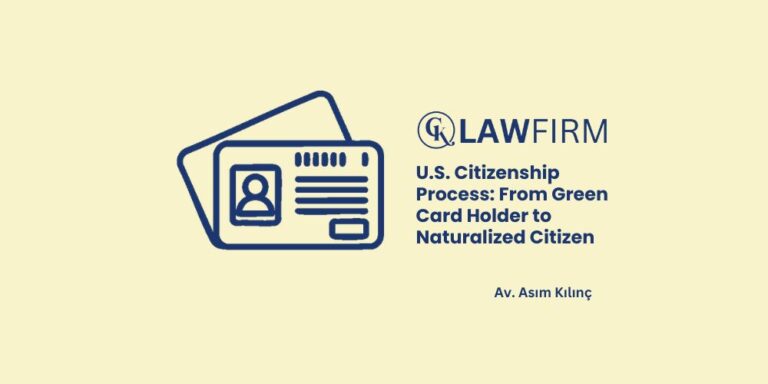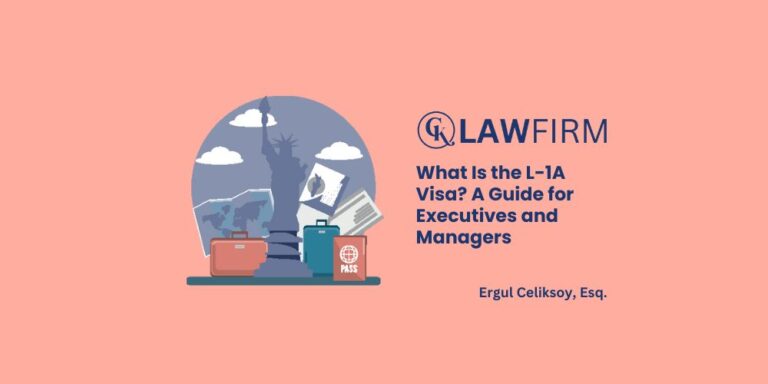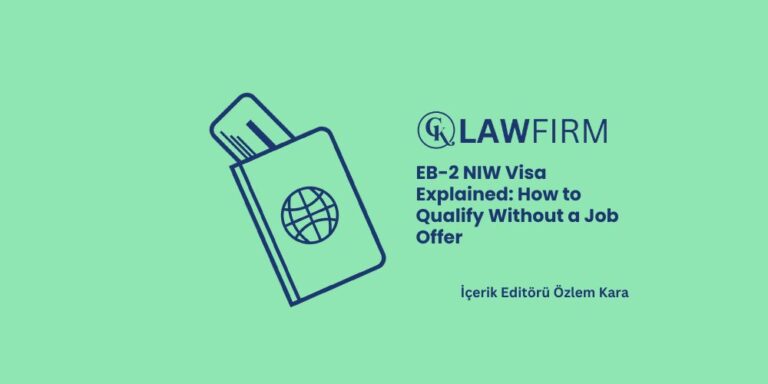Schedule an Appointment with Our Attorneys Now

Everything You Need to Know About the EB-1A Extraordinary Ability Visa
Learn about the EB-1A Extraordinary Ability Visa for working and obtaining permanent residency in the U.S. Explore the application process.
By Ergul Celiksoy, Immigration Attorney at CK Law Firm
In this week’s article, I focus on the EB-1A Extraordinary Ability Visa, also known as the EB-1A Green Card. I will address the most frequently asked questions about the EB-1A visa, based on the dozens of EB-1A Green Card cases I have prepared and the hundreds of clients I have consulted. By reading this article, you will find answers to the following questions:
- What is the EB-1A Extraordinary Ability Visa?
- What are the advantages of applying for the EB-1A Extraordinary Ability Visa?
- Who can apply for the EB-1A Extraordinary Ability Visa?
- What are the requirements to apply for the EB-1A Extraordinary Ability Visa?
- Where should you file your EB-1A Extraordinary Ability Visa?
- How long does it take to process an EB-1A Extraordinary Ability Visa if you opt for Premium Processing?
- What is the application process for the EB-1A Extraordinary Ability Visa?
- What should you expect after your EB-1A Extraordinary Ability Visa is approved by USCIS?
If you have any additional questions about the EB-1A visa, please do not hesitate to reach out to me via the comments section below, by sending me a direct message on LinkedIn, or by contacting me through the contact section on the CK Law Firm Immigration Attorney Firm’s website.
What is the EB-1A Extraordinary Ability Visa?
The EB-1A visa is a U.S. immigrant visa granted to individuals with extraordinary abilities in fields such as science, arts, athletics, education, and business. This means that if you possess extraordinary abilities in any of these fields, you can obtain a U.S. residency and work permit (Green Card) and subsequently pave the way for U.S. citizenship for yourself and your immediate family members.
Many of my clients initially find the term “extraordinary ability” intimidating and attribute great significance to this term. However, during the initial evaluation meetings, we often discover that the clients meet the criteria set by USCIS for this visa type.
To clarify the term “extraordinary ability,” let’s discuss what it truly means.
Extraordinary Ability: Do You Need to be Superman?
The short answer is “no.” USCIS does not expect you to be Superman or possess supernatural powers to apply for this visa. What USCIS means by “extraordinary ability” is that you should stand out from a substantial number of your colleagues due to your achievements and successes in your field.
Meeting 3 out of 10 Criteria
Individuals in fields like science, arts, athletics, and business must either have received national/international awards (such as Nobel, Emmy, Olympic gold medal) or meet at least three of the ten criteria listed on the USCIS website. Many clients focus on the initial part of the sentence mentioning prestigious awards and think they are not eligible for this visa. However, the USCIS has clear criteria, and you are expected to meet at least three of them. Thus, when evaluating your suitability for EB1-A visa, focus on whether you meet three out of the ten criteria listed on the USCIS website.
What are the Advantages of Applying for the EB-1A Extraordinary Ability Visa?
The EB-1A Extraordinary Ability Visa grants you and your immediate family (spouse and children under 21) the right to live and work in the United States (Green Card). After obtaining your Green Card, you can apply for U.S. citizenship after five years. Additionally, the number of applications for the EB-1A visa is significantly lower than for other immigrant visas, meaning the waiting time is considerably shorter, allowing you to potentially obtain a Green Card in a considerably short period of time.
Who Can Apply for the EB-1A Extraordinary Ability Visa?
Individuals with extraordinary abilities in science, arts, athletics, education, and business who can demonstrate that they will continue their success in the U.S. with supporting documents can apply for the EB-1A visa.
In all U.S. immigration processes, including the EB-1A Extraordinary Ability Visa, the burden of proof is on the applicant. This means that the USCIS officers evaluating your case will make a decision on the documents and petitions you and your attorney file.
What are the Requirements to Apply for the EB-1A Extraordinary Ability Visa?
To qualify for the EB-1A Extraordinary Ability Visa, you must meet at least three out of the ten criteria listed on the USCIS website and provide documentation to support your claims. When preparing applications for my clients, I focus on meeting at least 4-5 criteria instead of just three, as I have found this strategy effective in successfully getting the applications approved!
CRITERION 1: Receiving awards in the field:
The applicant must have received awards in their field. These awards must be well-known and highly regarded in the field. Local school certificates or minor regional awards are not considered national or international recognition. You must have received an award with national or international recognition to meet this criterion.
CRITERION 2: Membership in associations or professional organizations due to achievements:
This means being a member of well-known organizations in your sector where membership is significant. Simply paying membership fees to join an association does not meet this criterion. It refers to memberships that are earned through achievements and contributions.
CRITERION 3: Published materials about you or your works in professional or major trade publications:
This criterion requires that your achievements have been covered in the press and media. News articles in small local newspapers or personal blogs do not meet this criterion. You must have been featured in national or international media.
CRITERION 4: Judging the work of others in your field:
This means that you have evaluated the work of others in your field. This criterion is particularly easy for academic applicants to meet. If you have been a reviewer or editor for academic journals in your field, supervised PhD or master’s students, or participated in an academic committee to evaluate others’ work, you can easily fulfil this criterion. For non-academic applicants, serving as a jury member on a review panel in their field can also be used to meet this requirement.
CRITERION 5: Evidence of your contributions to your field:
You must provide evidence proving how you made scientific, academic, artistic, athletic, or industry contributions in your field. Emphasizing all original contributions you have made will strengthen your application. If you have made new discoveries, methods, or techniques in your field, this will be particularly beneficial. To document your contributions, you can include reference letters from other experts in your field as part of your application.
CRITERION 6: Authorship of scholarly articles:
This means having written articles or papers shared in journals or publications related to your field. Articles in local magazines or small-scale internet blogs do not meet this criterion. If you have published articles in reputable journals within your area of expertise, you can use these to fulfill this criterion. Additionally, if you have written articles for leading publications in your field, even if they are not academic journals, these can also be used to meet this requirement.
CRITERION 7: Exhibitions of your work at significant exhibitions or showcases:
Your work must be exhibited at significant industry exhibitions or showcases. Work displayed in local art galleries or school exhibitions is not considered significant. It is important to note that for this criterion, your works must have been included in nationally and internationally recognized and respected exhibitions. For artists in the film industry, participating in national and international film festivals and receiving awards can also be used to fulfil this criterion.
CRITERION 8: Leading or playing a critical role in a distinguished organization:
You must have held a leadership role in a distinguished organization in your field. Leading a small local club is not considered a critical role. As emphasized with previous criteria, simply being a manager or leader in any organization is not sufficient for this criterion. The organization where you have held a leadership role must be recognized, prestigious, and respected in your field.
CRITERION 9: Earning a high salary compared to others in your field:
You must have earned a significant income compared to others in your field. Earning an average salary in a local job does not count. The criterion generally refers to earning above the U.S. average salary. To meet this criterion, you need to provide evidence of the international salary or fee standards for your profession and demonstrate that your earnings are substantially higher.
CRITERION 10: Commercial success of your artistic performances in your field:
You can also use the commercial success of your artistic performances in your EB1-A visa application. To meet this criterion, you need to be actively engaged in the arts. Additionally, you must be able to document the commercial success of your artistic works. For instance, if you are a painter who has sold your paintings for a high amount, a singer who has earned significant income from numerous concerts, or a director whose film has achieved box office success, you can use these achievements to fulfil this criterion.
Preparing these files requires substantial work from both you and your attorney. Additionally, proper guidance and support letters are crucial in preparing the documents.
You can find out if you are eligible for the EB-1A visa by contacting me through cklawfirm.org, via email at eb2@cklawfirm.org, or directly on LinkedIn. All you need to do is to send us your resume, and we will get back to you within 24 hours.
Where Should You Apply for the EB-1A Extraordinary Ability Visa?
Once you have prepared all the necessary documents, you need to submit your application to the USCIS. Once your application is approved by the USCIS, then you can proceed with the second stage to get your Green Card. For the second stage of the application process:
- If you are in the United States, you can apply for Adjustment of Status by filing Form I-485 with USCIS.
- If you are in your home country, you can apply at the U.S. consulate in your country.
How Long Does It Take to Process an EB-1A Extraordinary Ability Visa if You Opt for Premium Processing?
If you opt for Premium Processing, your application will be processed by USCIS within 15 business days. If you do not choose this option, it may take 6-8 months to process your application. If you file your application with Premium Processing, you should also pay $2805 for the Premium Processing fee.
What is the Application Process for the EB-1A Extraordinary Ability Visa?
Remember, each applicant is evaluated based on their file. Therefore, when applying, you must clearly demonstrate that you meet the requirements with supporting evidence. The burden of proof is on you. You must prepare a comprehensive petition and include documents (newspaper articles, published works, reference letters, interviews, etc.) showing that you meet the criteria.
You must also fill out and include the I-140 form, available on the USCIS website, with your application file. The filing fee for I-140 form is $715.
What are the filing fees for EB-1A Extraordinary Ability Visa?
You should include the visa fees with your application when submitting your EB-1A application to USCIS. The EB-1A filing fees are as follows:
- Form I-140 Filing Fee: $715
- Asylum Program Fee: $300
- Premium Processing Fee: $2805 (optional)
What Should You Expect After Applying for the EB-1A Extraordinary Ability Visa?
Once you have prepared all the necessary documents and submitted your application, you can always check the status of your application on the USCIS Case Status website with your receipt number. It is important to closely monitor the process to avoid missing any critical actions.
After your EB-1A visa is approved by the USCIS, then the Green Card process begins. You need to apply for a Green Card based on this visa approval.
Conclusion
The EB-1A Extraordinary Ability Visa is an excellent option to achieve your American dreams, despite many details to consider throughout the process. You can find out if you are eligible for the EB-1A visa by contacting me through cklawfirm.org, via email at eb2@cklawfirm.org, or directly on LinkedIn. All you need to do is to send us your CV, and we will get back to you within 24 hours.
Who is Attorney Dr. Ergül Çeliksoy?
Attorney Dr. Ergül Çeliksoy is a co-founder of CK Law Firm. Dr. Çeliksoy has extensive experience in U.S. immigration law. He completed his master’s degree in international law and human rights at the University of Nottingham in 2017 and began his doctoral studies at the same university. Dr. Çeliksoy completed his Ph.D. in law at the University of Nottingham School of Law in 2022, crowning his academic career. Dr. Çeliksoy has published in leading academic journals and is internationally recognized for his expertise in modern slavery, criminal justice, and criminal law. A registered member of the California Bar, Dr. Çeliksoy provides superior service to his clients with his deep knowledge and experience in U.S. immigration law cases. His knowledge and experience in immigration law contribute valuable insights to CK Law Firm’s work in this area.
Dr. Çeliksoy offers comprehensive and strategic solutions to his clients in immigration law cases, helping them secure their legal status in the United States. His work in human rights and immigration processes, along with his deep knowledge of modern slavery and criminal law, allows Dr. Çeliksoy to effectively resolve the complex legal issues faced by immigrants. Dr. Çeliksoy strengthens CK Law Firm’s leadership in immigration law by providing reliable and effective legal counsel, helping his clients build their new lives in the United States.





